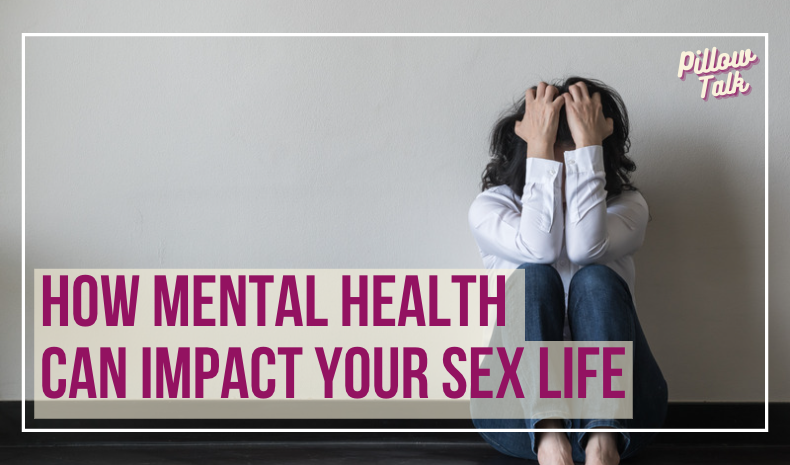How Mental Health Can Impact Your Sex Life
May is Mental Health Awareness month
Mental health includes our emotional, psychological, and social well-being. It affects how we think, feel, and act. It also helps determine how we handle stress, relate to others, and make choices.
Mental health conditions are far more common than you think. According to statistics:
- 1 in 5 U.S. adults experience mental illness each year,
- 1 in 20 U.S. adults experience serious mental illness each year,
- 1 in 6 U.S. youth aged 6-17 experience a mental health disorder each year, and
- 50% of all lifetime mental illness begins by age 14, and 75% by age 24
Many factors contribute to mental health problems, biological factors, such as genes or brain chemistry, life experiences, such as trauma or abuse, and/or family history of mental health problems.
Mental health can also affect your sex life. We often think of sex as something our bodies do, but our brain is our largest sex organ. It’s important to realize that our thoughts and feelings play a vital role in getting us turned on and keeping us that way. Mental health struggles can strongly affect arousal and make it hard to be relaxed enough to have or enjoy sex.


Depression and Sexual Health
Depression is a condition that can lead to a loss of interest in activities that a person formerly enjoyed, including sex. People struggling with depression often experience fatigue, apathy, low self-esteem, decreased energy, decreased sexual desire, and an inability to feel pleasure. As a result, they may pull away from the people they love, including romantic partners.
These symptoms can significantly impact a person’s sexuality and may contribute to sexual dysfunction. Antidepressants, particularly selective serotonin reuptake inhibitors (SSRIs), can also affect sexual function. SSRIs have known side effects such as decreased libido and arousal, erectile dysfunction, delayed ejaculation, and orgasm difficulties.
Anxiety and Sexual Health
Like depression, anxiety disorders also can cause decreased sexual desire and arousal. Because anxiety can distract a person from sexual stimuli, it can affect sexual desire and arousal. Anxiety symptoms such as worry, obsessive thoughts, panic, and fear of falling short of another’s expectations can cause premature ejaculation (PE) in men and difficulty reaching orgasm in women. Anxiety can also contribute to vaginismus in women, a condition that causes the vaginal muscles to spasm involuntarily in response to attempted penetration, making said penetration painful or impossible. Previous experiences with painful or unsatisfactory sex may trigger anxiety for future experiences, creating a vicious cycle of anxiety and sexual dysfunction.


Other Mental Health Issues and Sexual Health
Individuals struggling with feelings of guilt, stress, low self-confidence, insecurity in their relationship, and/or concerns about their sexual performance may notice that these situations affect their sexual health. It can be challenging to be fully present during a sexual encounter when one is dealing with negative thoughts and emotions, which may impair sexual arousal and response.
Mental Health Medications and Sexual Health
While the aforementioned mental health issues can affect your sexual health, the medications taken to help mitigate the symptoms can also affect sexual health. Many prescriptions have side effects that can cause lowered sex drive, delay in orgasm, or the inability to orgasm. Not everyone who takes these medications, like Paxil, Prozac, Zoloft, and Lexapro, causes sexual side effects, but it is a listed side effect for many.
It can feel like a double-edged sword; on one end, you have mental health problems that you want treated; on the other, you have sexual health problems caused by mental health issues and the mental health medications. First and foremost, always talk with your doctor before stopping or changing a medication or health plan. Your safety is important, so while it may be uncomfortable to discuss sex with your physician, they are your doctor and are only there to help you the best they can. If they cannot offer the support you need, you can consider seeing a sexual health therapist.


Sexual Wellness Can Support Mental Health
Even though mental illness can negatively affect your sexual health, having sex can improve your mental health. Having sex provides many health benefits that can positively affect your mental health by boosting serotonin—the hormone released during sex—which helps improve your mood, fight off depression, and improve self-esteem, cognitive abilities, and sleep. Research also suggests that sexually active adults between 50 to 90 years old have a better memory. They were also less likely to feel depressed and lonely.
Sexual activity, like exercise, can also help reduce stress and anxiety and increase happiness. A 2010 study suggests that sexual activity can increase a person’s levels of trust, intimacy, and love in relationships and the ability to perceive, identify, and express emotions.
If you suffer from any of the mentioned mental health issues, it’s important to speak with a mental health care provider such as a psychologist, psychiatrist, or sex therapist. A mental health professional can provide advice on managing mental health conditions and navigating any negative effects mental health problems or medications have on your sexual health.
For more tips, visit us on social media.





